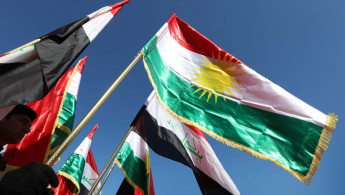Iraqi PM makes first visit to Kurdistan region to ease fraught Baghdad-Erbil tensions
Iraqi Prime Minister Mohammed Shia Al-Sudani on Tuesday arrived in Erbil on the first visit to the Kurdistan region of his premiership, where he met with senior Kurdish officials and discussed drafting a national hydrocarbon law.
Following his arrival at Erbil International Airport, Sudani and a delegation of senior Iraqi government officials were received by the Kurdistan Regional Government (KRG) Prime Minister Masrour Barzani.
After their meeting, Sudani and Barzani both expressed their hope for solving outstanding disputes between Baghdad and Erbil, particularly those related to oil and gas.
"The KRG has shown real will and cooperation to resolve all the issues," Sudani said.
He also indicated that his government is keen to implement Article 140 of the Iraqi constitution to settle the fate of who controls Kirkuk and other areas disputed between Baghdad and Erbil.
Sudani also confirmed his cabinet has officially recognised Halabja as Iraq's 19th governorate and said he will take other steps in favour of the people of the city, which was subject to a chemical attack by former President Saddam Hussein's forces in 1988 killing 5,000 people and wounding thousands more.
I welcome @mohamedshia on his first visit to the Kurdistan Region. The PM's goodwill is recognized and important to restoring trust. The federal budget bill and progress on oil and gas give us stakes in our finances and lay foundations for deeper ties.
— Masrour Barzani (@masrourbarzani) March 14, 2023
Let's build on them -mb. pic.twitter.com/GibjriUGCl
"PM Sudani's visit to Erbil will definitely reinforce relations between both the Iraqi government and the KRG," an official source in the KRG told The New Arab on condition of anonymity.
"We made good progress and will continue in our cooperation with the federal government in this regard," Barzani said when asked about the results of talks between both sides over Iraq's long-standing oil and gas draft law.
"I hope the Iraqi parliament will soon pass Iraq's budget bill for 2023 which will be in the interests of all people of Iraq. We discussed mechanisms with PM Sudani on how to implement this budget. Within the budget law, we can take other steps for resolving other issues, for example the oil and gas draft law."
Sudani's cabinet on Monday passed the federal budget bill for 2023 the next two years, sending it to the Iraqi parliament for approval.
During his visit, Sudani also met with the president of the ruling Kurdistan Democratic Party (KDP) Masoud Barzani in Erbil and is scheduled to meet KRG President Nechirvan Barzani.
Sudani is set to visit Sulaimaniyah city on Wednesday where he is expected to address a two-day forum held by the American University of Iraq - Sulaimani (AUIS).
Kurds hope to receive more than 12 per cent of the national budget in return for sending their oil to Iraq's State Oil Marketing Organization (SOMO) and also submitting tax revenues from the border points to the Iraqi finance ministry.
Drafting a thorny hydrocarbon law for Iraq is one of the top priorities of PM Sudani's government.
Sudani, 52, was chosen to form the new government on 13 October following months of infighting between pro-Iran factions and parties loyal to Iraqi nationalist Shia cleric Moqtada Sadr.
In the past few years, the Iraqi government said that the KRG did not respect its promises to export oil via SOMO. In response, Baghdad did not send a full budget to the Kurdistan region.
The KRG accuses Baghdad of politicising the budget issue and not fulfilling its duties as per the yearly budget law passed by the parliament.
The Iraqi Federal Supreme Court, the highest court in the country, in mid-February ruled that the Kurdistan region's oil and gas law, passed in 2007, is void.
The court also described all contracts signed between the KRG and the international oil companies for extraction and importing oil and gas from the region as 'illegal'. The KRG is legally bound to accept the decision by the court, however, it continues to export nearly 500,000 barrels of oil per day via neighbouring Turkey.
Iraqi Kurdistan started exporting its oil independently without the consent of the federal government in Baghdad in 2014.





 Follow the Middle East's top stories in English at The New Arab on Google News
Follow the Middle East's top stories in English at The New Arab on Google News


